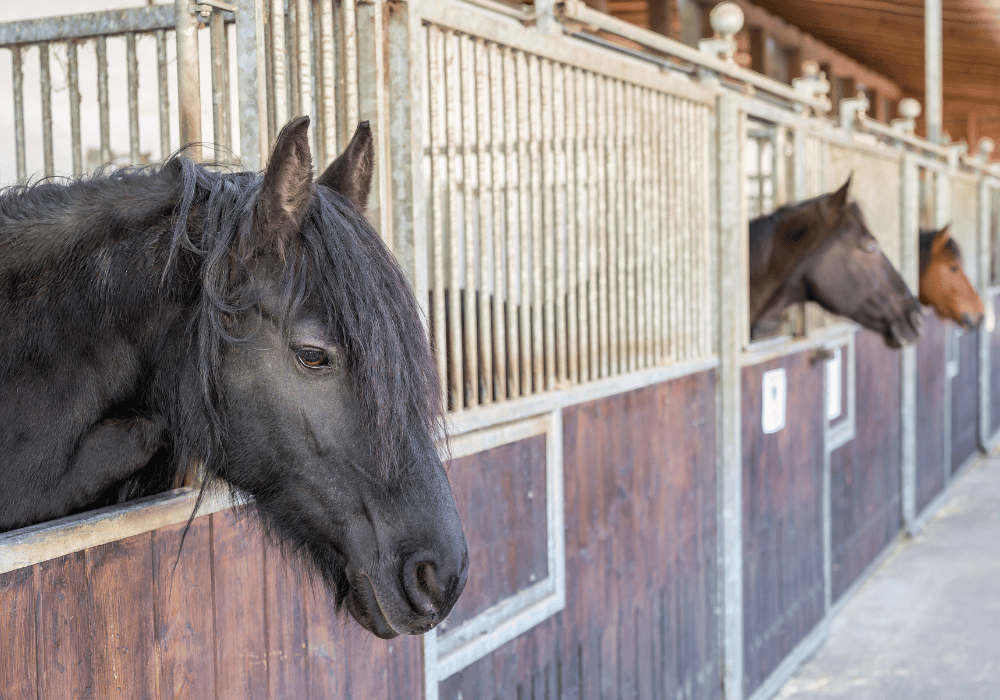Equine biosecurity focuses on preventing the introduction and spread of infectious disease to yards and venues. It is a vital aspect of equine management for both yard managers and business owners, and it is essential that the entire equine community is educated on the importance of biosecurity protocols.
The importance of implementing robust equine biosecurity measures cannot be understated. Not only can biosecurity measures safeguard the health and well-being of our horses, it is also vital when it comes to maintaining a smooth-running and profitable equestrian business.
Why is Biosecurity Important?
Disease outbreaks within the equine population can have devastating consequences for both horse owners and yard managers as well as, of course, the horses themselves.
Uncontrolled outbreaks can lead to financial losses for owners, disruption of competitions and events, and reputational damage for yards and venues. Widespread disease outbreaks can lead to the breakdown of businesses due to the costs incurred. By prioritising biosecurity, horse owners can proactively reduce the likelihood of disease outbreaks and limit its often far-reaching impact.
Amongst the most important diseases to protect against are equine influenza, strangles and EHV, as well as ringworm. These diseases can spread rapidly throughout equine populations, posing risks to both individual horses and the equine community at large.
Protect Your Yard with Biosecurity Protocols
Implementing biosecurity protocols on your yard is crucial for minimising the risk of disease transmission and ensuring the health and safety of your horses.
We highly recommend that livery yards and venues should implement the following biosecurity protocols:
- Encourage owners to regularly take their horse’s temperature and know what’s normal for their horse
- Implement quarantine protocols for new arrivals. Ideally, new horses should be isolated (no direct or indirect contact) from other horses for a minimum of 21 days. If possible, they should be kept in a separate area of the yard
- All staff members should practise good hygiene by ensuring equipment isn’t shared between new horses and horses that have been on the premises for some time
- Promoting vaccination against common equine diseases and making sure vaccinations are up to date. Yard owners should ask to see vaccination history before allowing a new horse onto the yard
- Regularly communicating with equine vets and continually educating staff and visitors on the importance of a comprehensive biosecurity plan
- Avoid sharing water buckets between horses
- Maintaining good biosecurity at events by only travelling to an event if your horse is well and fully vaccinated. You should also avoid grazing your horse at venues and not allow your horse to drink from communal water troughs at events
By adopting a proactive and collaborative approach to biosecurity, equine business owners can protect their investments, maintain the health of their horses and contribute to the overall welfare of the equine community.
What to do in the Event of a Disease Outbreak
If there is an outbreak of an equine disease on your yard, it’s vital that you manage the outbreak as quickly as possible.
If you’re concerned that your horse has been exposed to an equine disease, or you notice that a horse on the yard seems unwell, you should immediately isolate the horse and contact your vet. Closely monitor the horse and ensure no equipment is shared between horses. You should assign a designated staff member to care for that horse alone, and ensure that other staff members and visitors do not go near or touch the horse.
One of the most important things is to ensure you notify nearby yards of the outbreak. You should also ensure any visitors to your yard are notified, including owners and farriers.
You can read our case study for an example of equine biosecurity in action here.
Equine Biosecurity Advice | Avonvale Equine Vet Practice
Our experienced and highly qualified equine vets are happy to advise clients on biosecurity protocols. Whether you own a private yard, livery yard or commercial / competition yard or venue, we can support you with developing your biosecurity plan. Our equine vet practice also offers free weekly zone visits, so you can keep your horse’s vaccinations up-to-date without paying a call-out fee.
Please contact our reception on 01295 670 501 to speak to a member of our team.









